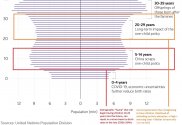I don't believe the problem is cultural. China's fertility rate was 2.73 in 1988 and dropped sharply to 1.62 in 1998. I don't believe the basic underlying culture can change so much in one decade.
I don't know the exact timeline but it is absolutely culture. Let this be clear: Chinese people will have whatever we
want to have regardless of the law, the circumstances, and even natural biology sometimes. We are the best at finding ways to make things work. My wife and I are both 35+, with careers that take up most of our time but when I said we need 4 kids, she jumped right on it, set up IVF with surrogacy and we are like 75% done in 2.5 years (overcoming major hiccups on the way). As a geneticist, I place so much importance on having children that I would rather be blue collar and work for basic wages and have 4 kids than a millionaire with 1. So if Chinese people don't want to have kids, they are either wayyyy to old, infertile in an extreme way (both beyond modern science and very rare), or they don't want to. It's the latter in the vast majority of cases.
The problem is that culture tells people it's ok; the DINK life is great! You get to spend all your money on yourselves, have vacations, don't have to take care of anyone, look cool with no obligations, etc... all selfish reasons imported from the West, which is also suffering this issue in every first world well-to-do population (and I mean population as in subgroups within nations). The is probably even worse in China because the Chinese have the ability of picking something up and taking it to a higher level than the original; great for tech, terrible for bad habits/culture. And as this is basically the first generation of DINK culture, we have yet to see large numbers of old childless people die in emptiness and regret to set a warning to the youth. China's fertility issue would be over instantly if the stigma was culturally implemented that childless people are irresponsible, selfish, and stupid with dead end barren futures and they don't deserve the love and care their parents gave them because they refuse to pay it forward (and backwards denying their parents the joy of grandchildren).
The only real downside to immediately striving to go this route is the loss of productivity. When parents decide that they need multiple kids no matter what and the grandparents are dead or unable to help, work productivity will be sacrificed, at a crucial phase in the fight against the US. So the question is, do we want to take the hit now and invest in the future immediately risking a much longer cycle to overtake the US or do we want to hold onto the throttle and take the overheat damage a little longer to overtake the US, then let off the power to recover? The longer we stay on the throttle, the greater the damage but the sooner we overtake the US, the sooner we create an overall environment that is positive and conducive to Chinese efforts in all directions. It's really not an easy choice.

